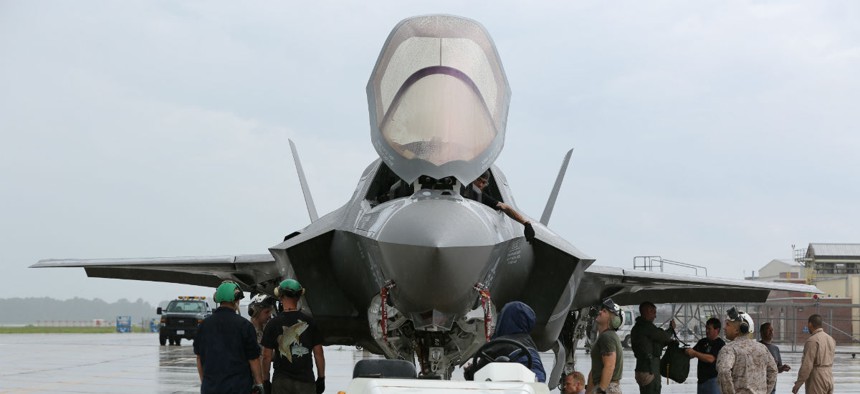
Cherry Point service members prepare an F-35B Lightning II for transport to Fleet Readiness Center East for maintenance. Pfc. Victor A. Arriaga / Defense Department file photo
Whistleblower Persuades Navy to Correct Risky Jet Fuel Waste
Office of Special Counsel brought to light discarding of 12,000 gallons a year.
Disclosures from a Marine Corps maintenance control coordinator at a North Carolina jet fueling facility prompted the Navy to correct unsafe, unauthorized and wasteful fuel disposal practices, the Office of Special Counsel announced on Wednesday.
Glenn Schwarz, stationed at the Fleet Readiness Center East Marine Corps Air Station at Cherry Point, which services jets used by the Navy, Marine Corps, Army, Air Force and 31 foreign forces, warned supervisors of problems beginning in September 2013, including revealing in March 2015 the fact that 17,000 gallons of usable fuel in the past nine months had been wrongfully disposed.
While JP-8 grade fuel is typically used on F-35 jets, Schwarz documented that as a matter of policy, the aircraft landing at Cherry Point were being filled with JP-5 fuel, a kerosene-based fuel designed for carrier based jet airplanes, the special counsel said in letter accompanying a December Navy investigative report forwarded to the House and Senate Armed Services committees this week.
“In the event that a plane lands at FRC East with JP-8 fuel in its tanks, fuel artisans label it as contaminated and destroy it,” the office said. “Mr. Schwarz noted that pursuant to the [Navy’s standard fuel] manual, in this situation JP-8 must be reused in powered ground support equipment, such as refuelers, tugs and ground power units, or used in fuel test cells to facilitate their calibration.”
The improper discarding of fuel amounted to 12,000 gallons a year, and continued despite some corrective actions, Schwarz said in his whistleblower disclosure to OSC.
The Navy probe stemmed from an OSC referral last August alleging that Cherry Point maintenance employees, “engaged in conduct that may constitute a violation of law, rule, or regulation; gross mismanagement; a gross waste of funds; and a substantial and specific danger to public safety.”
The service’s probe in addition found that Cherry Point staff did not test fueling truck hoses and gauges at the intervals required by Navy regulations and did not perform equipment maintenance inspections prior to June 2015. Fuel hoses were in “extremely poor condition, and one was worn down to the metal,” the Navy said in its report. Before December 2013, the facility’s team also failed to properly test jet fuel.
“FRC East’s failure to test these systems could have allowed contaminated fuel to cause an engine malfunction or failure during flight,” the Navy wrote. “FRC East’s negligence also increased the risk that fuel pumped through deteriorating fuel hoses could spill and ignite, threatening the lives of personnel.”
However, the Navy found no records of mishaps based on the problems. Separately, Navy investigators found that FRC East discarded fuel that could have been used in aircraft not departing for sea duty, wasting about $71,000 annually.
The Navy and FRC East have since taken a variety of corrective actions recommended in the report under a new commanding officer.
“Mr. Schwarz’s disclosures will save the Navy money and may also prevent a fatal tragedy involving our men and women in uniform,” Special Counsel Carolyn Lerner said. “While the Navy is now taking these issues seriously, it is troubling that no employees were held accountable for allowing serious safety problems to persist, despite being aware of fuel testing improprieties for two years.”







